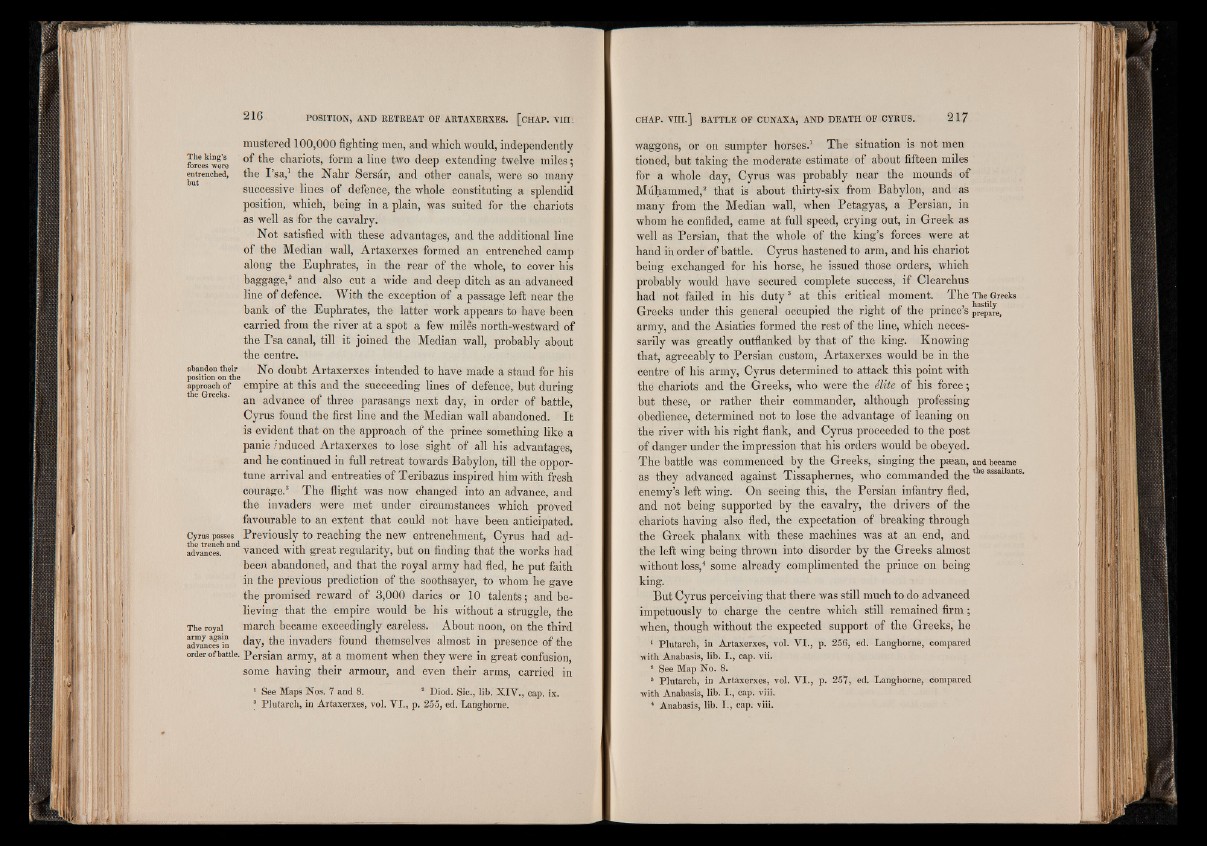
mustered 100,000 fighting men, and which would, independently
forces were chariots, form a line two deep extending twelve miles;
entrenched, the I ’sa,1 the Nahr Sersar, and other canals, were so many
successive lines of defence, the whole constituting a splendid
position, which, being in a plain, was suited for the chariots
as well as for the cavalry.
Not satisfied with these advantages, and the additional line
of the Median wall, Artaxerxes formed an entrenched camp
along the Euphrates, in the rear of the whole, to cover his
baggage,2 and also cut a wide and deep ditch as an advanced
line of defence. With the exception of a passage left near the
bank of the Euphrates, the latter work appears to have been
carried from the river at a spot a few miles north-westward of
the I ’sa canal, till it joined the Median wall, probably about
the centre.
abandon their No doubt Artaxerxes intended to have made a stand for his position on the
approach of empire at tnis and the succeeding lines of defence, but during
e ree s' an advance of three parasangs next day, in order of battle,
Cyrus found the first line and the Median wall abandoned. It
is evident that on the approach of the prince something like a
panic induced Artaxerxes to lose sight of all his advantages,
and he continued in full retreat towards Babylon, till the opportune
arrival and entreaties of Teribazus inspired him with fresh
courage.3 The flight was now changed into an advance, and
the invaders were met under circumstances which proved
favourable to an extent that could not have been anticipated.
Cyras passes Previously to reaching the new entrenchment, Cyrus had ad-
advances. an vanced with great regularity, but on finding that the works had
been abandoned, and that the royal army had fled, he put faith
in the previous prediction of the soothsayer, to whom he gave
the promised reward of 3,000 darics or 10 talents; and believing
that the empire would be his without a struggle, the
The royal march became exceedingly careless. About noon, on the third
advaniSin day, the invaders found themselves almost in presence of the
order of battle. Persian army, at a moment when they were in great confusion,
some having their armour, and even their arms, carried in
1 See Maps Nos. 7 and 8. 2 Diod. Sic., lib. X IV ., cap. ix.
3 Plutarch, in Artaxerxes, vol. V I., p. 255, ed. Langhorne.
waggons, or on sumpter horses.1 The situation is not men
tioned, but taking the moderate estimate of about fifteen miles
for a whole day, Cyrus was probably near the mounds of
Muhammed,2 that is about thirty-six from Babylon, and as
many from the Median wall, when Petagyas, a Persian, in
whom he confided, came at full speed, crying out, in Greek as
well as Persian, that the whole of the king’s forces were at
hand in order of battle. Cyrus hastened to arm, and his chariot
being exchanged for his horse, he issued those orders, which
probably would have secured complete success, if Clearchus
had not failed in his duty3 at this critical moment. The The Greeks
Greeks under this general occupied the right of the prince’S prepare,
army, and the Asiatics formed the rest of the line, which necessarily
was greatly outflanked by that of the king. Knowing
that, agreeably to Persian custom, Artaxerxes would be in the
centre of his army, Cyrus determined to attack this point with
the chariots and the Greeks, who were the élite of his force ;
but these, or rather their commander, although professing
obedience, determined not to lose the advantage of leaning on
the river with his right flank, and Cyrus proceeded to the post
of danger under the impression that his orders would be obeyed.
The battle was commenced by the Greeks, singing the psean, and became
as they advanced against Tissaphernes, who commanded thethe assailants-
enemy’s left wing. On seeing this, the Persian infantry fled,
and not being supported by the cavalry, the drivers of the
chariots having also fled, the expectation of breaking through
the Greek phalanx with these machines was at an end, and
the left wing being thrown into disorder by the Greeks almost
without loss,4 some already complimented the prince on being
king.
But Cyrus perceiving that there was still much to do advanced
impetuously to charge the centre which still remained firm ;
when, though without the expected support of the Greeks, he
1 Plutarch, in Artaxerxes, vol. V I., p. 256, ed. Langhorne, compared
with Anabasis, lib. I., cap. vii.
2 See Map No. 8.
8 Plutarch, in Artaxerxes, vol. V I., p. 257, ed. Langhorne, compared
with Anabasis, lib. I., cap. viii.
* Anabasis, lib. I ., cap. viii.